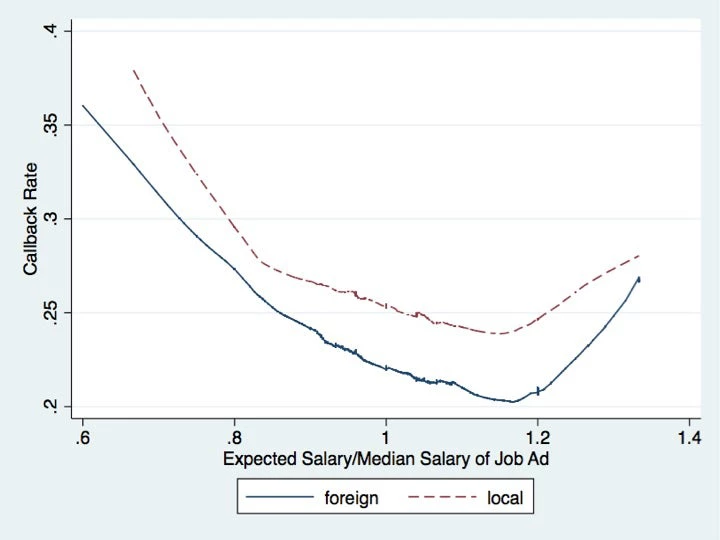This is the first of our series of posts by students on the job market this year.
Return migration is an important channel through which migrant-sending countries stand to benefit from international migration. Experts often cite “brain gain” as its chief benefit: migrants not only bring back their original human capital but also new skills, connections, and experience acquired in foreign countries (see for example IOM 2008, Dayton-Johnson et al. 2009, and this UN report). But whether or not domestic employers in fact value foreign work experience in production processes at home is unclear. Skills learned abroad may be irrelevant. Worse, absence from the local labor market could be detrimental if the skills that employers value depreciate as a migrant spends time abroad. In my job market paper, I examine precisely this question: do employers actually value the foreign work experience of returning migrants?
I conduct an experiment in the Philippines, one of the largest migrant-sending countries in the world. I send over 8,000 fictitious resumes in response to online job ads. Resumes describe typical Filipino workers with similar backgrounds, except I randomly vary resumes to possess different lengths of foreign work experience. I target low and high skill employment ads in sales, administrative, construction, finance, and IT job categories. Callbacks for an interview by an employer are recorded for each resume. Because foreign work experience is randomly assigned across resumes, the basic analysis compares callback rates between those who had varying work experience abroad with those with only domestic work experience. This provides a causal estimate of the value of foreign work experience, as perceived by home country employers.
The main finding is that employers do not appear to value work experience abroad; in fact, they seem wary of it. Job applications with foreign work experience receive 12% fewer callbacks than otherwise identical job applications (2.8 percentage points of the mean callback rate of 24%). The negative effect is consistent across industries. In addition, the callback rate decreases as workers spend more time abroad instead of in the home country. Employers disfavor return migrants over non-migrants with comparable skill, experience, and educational background.
A key question of course is why?
Potential Explanations
Below, I offer some reasons for why employers may appear to disfavor return migrants. I exploit how I varied several resume characteristics such as declared expected salary and the quality of resumes to distinguish between explanations. While the details are in the paper, I present evidence that attempt to rule out certain mechanisms while favoring a particular explanation.
1. Do employers think return migrants have higher expected wages?
- The hypothesized mechanism relies on expected wages being unobserved, but in the experiment, wages are made explicit. One of the cool features of the job websites I used is that they allow applicants to declare their expected wage for the job. Thus, I randomized declared expected wage for each fictitious application. Higher expected wages lead to fewer callbacks, which suggests that employers interpret declared wage as some signal of a worker’s reservation wage. However, even when expected wages are declared, foreign work experience continues to exhibit its negative effect. The figure below shows that resumes with foreign work experience receive a lower callback rate at all levels of declared expected wage.

2. Do employers believe return migrants are overqualified?
- Employers may prefer workers who just fulfill minimum job applications; however, this does not seem to be a compelling explanation for my results. I cross-randomized resumes on whether they were high quality or low quality. High quality resumes described applicants from elite educational backgrounds, who possessed additional skills, and had 2 more years of work experience whereas low quality resumes just fit minimum qualifications for the job. If overqualification is the main explanation then high quality applicants should have had fewer callbacks then low quality applicants. But high quality applicants had more.
- Are the people who return those who couldn’t make the cut abroad? The underlying economics suggests that if employers think this is true, then the negative effect of foreign work experience should depend on having spent any time abroad (the extensive margin), and not on duration or years spent abroad (the intensive margin). If anything, the negative effect should be most prominent (and the callback rate lowest) for workers whose stay abroad were shorter since there is less reason to suspect failure from workers who were able to stay abroad longer. But the data reject this reasoning. The decline in callback rates is not explained by having returned from abroad as much as it is by time spent abroad. Again, the callback rate decreases as workers spend more time abroad instead of in the home country.
The explanation I favor is the idea of depreciating location-specific human capital. Employers may value domestic over foreign experience because the local context requires knowledge of location-specific production methods. Spending time away from home, migrants lose this knowledge of the local economy and their human capital depreciates.
I conducted a sub-experiment to test this theory. Keeping all procedures the same, I sent 2000 additional resumes to job ads, except I altered the timing of foreign experience for return migrants. Instead of having foreign work experience listed in the last job held, I list it in the first job held. Therefore, all return migrant job applicants are made to have some recent local job experience. If location-specific human capital is a prevailing explanation, then this alteration should result in a reduction of the negative effect of foreign experience compared to the original experiment.
The results are suggestive: compared to the main experiment, the negative effect of foreign experience in the sub-experiment appears to be smaller in magnitude, around 2/3 of the original effect.
The Take-away
We should not interpret these findings to ultimately mean that return migration has little value. There are other channels through which return migrants could bring value to their home countries, apart from foreign work experience. Returnees could bring home monetary savings, an experience of well-functioning political institutions abroad, and raised expectations for their home country ( Clemens 2009). Yang (2006) shows that investment increases, at least for some migrant households, upon return. Moreover, research reveals that migrants could spur the improvement of political institutions at home (see for example Spilimbergo 2009, Saxenian 2006, and Iskander 2009). These topics are outside the scope of this work.
Nevertheless, this paper brings to light a much less recognized aspect of return: that return migrants may not fare as well in the domestic labor market as commonly assumed. This offers an alternate perspective on the design of return migration programs. Providing generous financial incentives to attract nationals living abroad to come home has often been the focus of such programs. While my findings cannot rule out the importance of such programs, they suggest that efforts to reintegrate returning migrant workers to help ease them back into the workforce in the origin country may deserve attention as well. For even without active encouragement, many international migrants have no choice but to return to their origin country. Temporary labor migration programs are commonplace all over the world ( OECD 2014). It is important to understand the implications of return for these migrants if home country governments are to assist them.
Paolo Abarcar is a Ph.D. candidate in Economics and Public Policy at the University of Michigan. More details about his research can be found on his webpage .


Join the Conversation